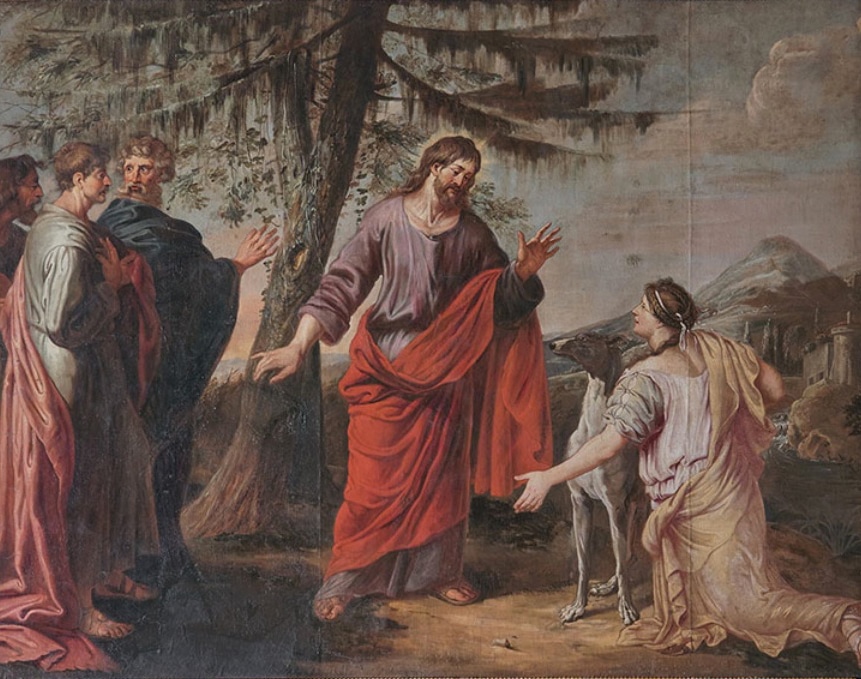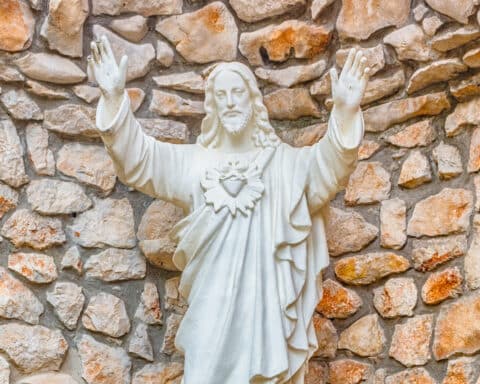Our Gospel reading for this Sunday is a hard one. But we have been prepared to read it well by first reading Christ’s parables over the past few weeks. Christ’s parables have asked us to read and to listen well, and to often take a second look so that we might better grasp the truth being revealed to us in images of fields and seeds and leavened bread. In this way, we have been prepared for the difficult passage given to us this Sunday from Matthew 15:21-28. It certainly repays a careful read!
But, first, why is this passage so hard?
Because, at first glance, Christ’s responses to the Canaanite woman (or lack thereof) seem so difficult! The Canaanite woman — whose name, let’s note, we do not know — seems to be totally rebuffed by Christ. At first, he does not even answer her piteous plea for her daughter’s healing. And then, when he does reply, he informs her that he was “sent only to the lost sheep of the house of Israel,” and, further, that “it is not right to take the food of the children and throw it to the dogs.”
Now, schooled by the previous weeks, we have to ask what Christ means by this comparison of sheep and dogs. At first, we might be tempted to think: “Wow! Hasn’t Jesus read the Gospel?!” Yet, if we take a second look, we will see that this very passage, rather parable-like, itself proclaims the good news.
Accordingly, the first thing we need to take better note of as we reread these seven verses of Matthew is the unnamed Canaanite woman. She comes to ask for Christ’s mercy. Indeed, she asks Christ three times, persisting in her request: “Lord, help me.”
| August 20 – 20th Sunday in Ordinary Time |
|---|
|
Is 56:1, 6-7 Ps 67:2-3,5, 6, 8 Rom 11:13-15, 29-32 Mt 15:21-28 |
Undeterred and full of hope, all three of her pleas were delivered with great humility and even as “homage to Christ! The Canaanite woman does not presume to deserve Christ’s attention or God’s mercy. And so she feels no rebuff. Indeed, she already knows that she is not one of the sheep “of the house of Israel,” lost or not. Likewise, she knows she is not one of “the children” who eat at the master’s table. In fact, in a striking contrast, she identifies herself as a “dog” seeking only “the crumbs that fall” from the master’s table.
With this, the Canaanite woman invites us all to recognize that, like her, we are not one of the elect, chosen since Abraham’s calling to sit at the master’s table. We are but “dogs” seeking crumbs.
What, then, if we, too, could approach Christ with such humble homage, like the Canaanite woman? It is what the first reading calls for: “Make joyful in my house of prayer.” Taking, heed, we would, I think, break through to the passage’s meaning, for it is only from this vantage point — that of the dog — that we can consider most truly what Matthew 15:21-28 reveals.
We must learn that God’s mercy is not owed to us. Or to anyone. Stated more positively, God’s mercy is absolutely, entirely, completely gratuitous. This is the good news!
God himself became a Son of David, a child at the table, a sheep of the House of Israel. God became such a child because he had promised Abraham, called gratuitously himself to become this house, that it would be through Israel that all blessings would flow (cf. Gn 12:3).
The Canaanite woman, in her great faith, recognized just this: “Please, Lord, for even the dogs eat the scraps that fall from the table of their masters.” Perhaps we could use the words of the psalm to join her in her homage this Sunday, “O God, let all the nations praise you!”





